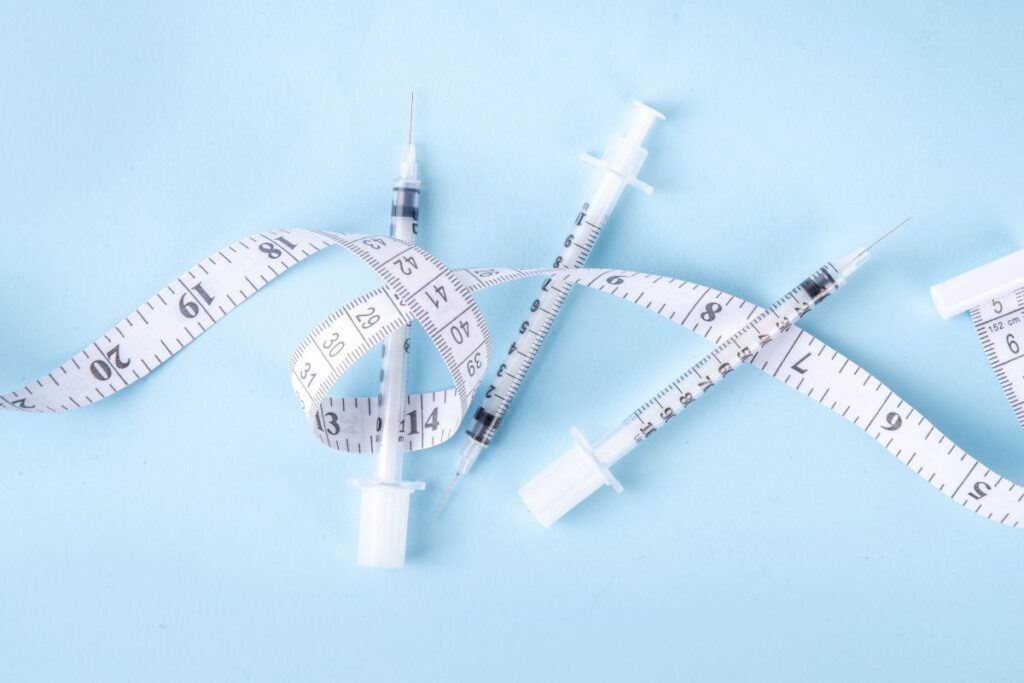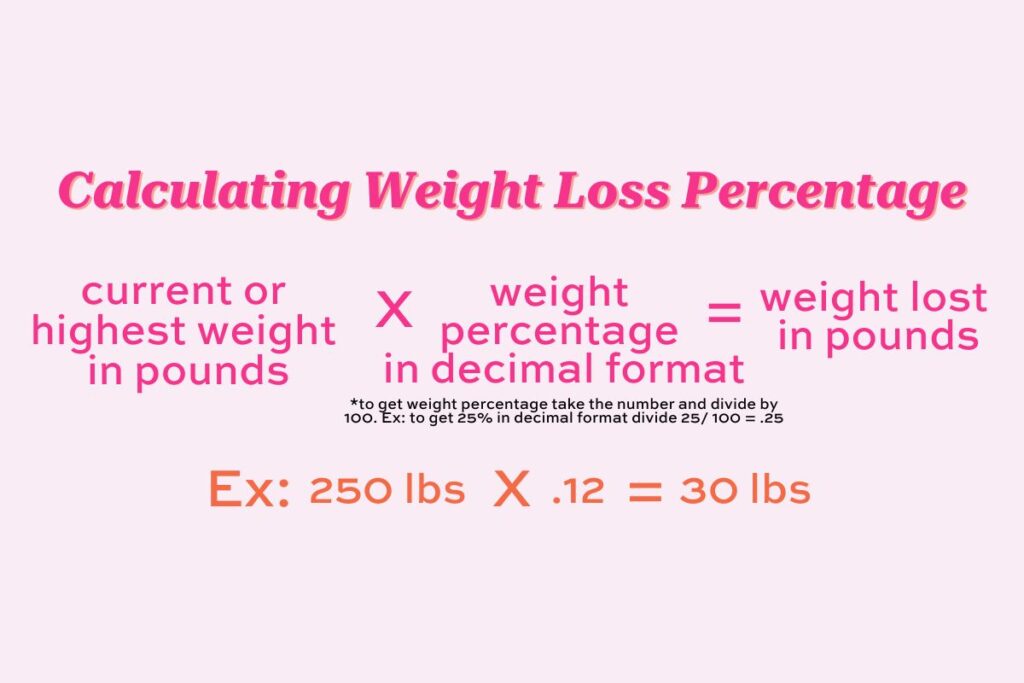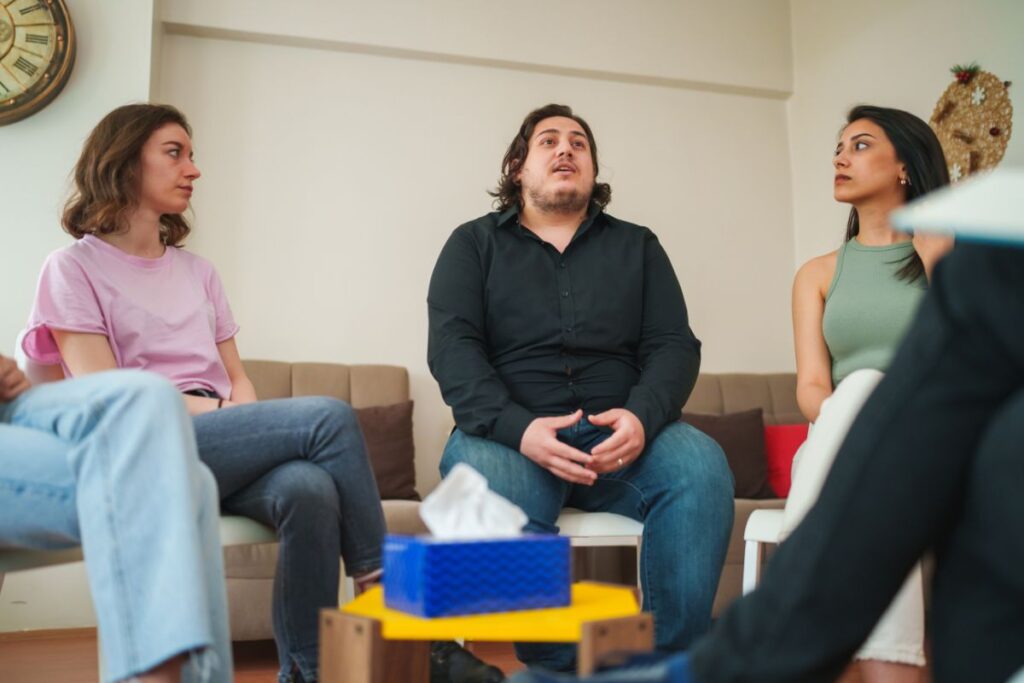You started semaglutide because you heard so many incredible things about these “magical” GLP-1 medications. Your hopes were high, since everyone you know just raves about how Ozempic and Wegovy are changing their lives when it comes to getting the scale to move.
Except you’re wondering “Have I been lied to?” or “Am I broken?” Because despite starting your own GLP-1 journey, semaglutide just isn’t getting the scale moving like you had hoped.
Hi, I’m Jamie! I’m a registered dietitian who specializes in bariatrics, weight loss, and nutrition for people on GLP-1s. Not only do I love supporting people on their GLP-1 weight loss journeys, but I’ve been on one myself and have experienced these medications firsthand!
In today’s sit down I’m going to dive into what to do if you’re not losing weight like you thought you would on semaglutide. I’m going to go over what semaglutide is, how these medications work, what they can do for you, and what they can’t do for you so you can move forward with a solid plan to hit your weight loss goals!
What is semaglutide?
Semaglutide is a type of injectable GLP-1 medication. GLP-1 medications are truly changing the game when it comes to anti-obesity medications (AOM’s). While AOM’s have been around for decades, GLP-1’s are the first class of weight loss meds that are actually showing significant weight loss results.
There are different types of GLP-1 medications. The most common ones that are being prescribed for weight loss are
- Liraglutide (name brands Saxenda and Victoza)
- Semaglutide ( name brands Ozempic and Wegovy)
- Tirzepatide (name brands Mounjaro and Zen Bound)
In recent years, semaglutide and tirzepatide have become the most popular ones prescribed for weight loss.

How do GLP-1 medications work?
GLP-1 is an incretin hormone that our bodies naturally produce. GLP-1 helps manage blood sugar levels by increasing insulin production, inhibiting glucagon, and slowing gastric emptying, which is the rate at which we digest food.
When you’re on a GLP-1 medication, like Ozempic or Wegovy, you are essentially injecting this hormone and your body is receiving it at a therapeutic level and at a continuous rate.
Because of the delayed gastric emptying, these medications help you feel fuller much longer and ultimately signal to your brain you are satisfied with your food, which allows you to avoid over eating and constantly thinking about food.
How much weight can you lose on a semaglutide?
Studies have shown that you can lose anywhere from 12-15% of your total body weight in a 68 week period.
Here’s how to determine what that looks like for you in pounds:

So for someone who is 250 lbs that would result in approximately 30 – 37.5 lbs in a 68 week period. Some may even even lose closer to 18% which would be closer to 45 lbs for someone starting at 250 lbs.
GLP-1 Resistance
All that to say, there are some patients who report “GLP-1 Resistance.” GLP-1 resistance is a fancy term for being unable to lose weight while on a GLP-1 medication.
GLP-1 resistance is often associated having high levels of excessive or visceral fat. Visceral fat is the fat that is stored in the abdomen as well as surrounding organs like the liver, pancreas, and intestines. Whereas subcutaneous fat is the fat that is stored just below the skin.
GLP-1 resistance is also more prevalent in people with Type 2 Diabetes. It’s been found that gut microbiota dysbiosis (aka an imbalance with the healthy microorganisms that live in the gut affecting gut health) plays a factor in the GLP-1 resistance in individuals with Type 2 Diabetes.
Now while some people may have true GLP-1 resistance, there’s no need to panic! The majority of people on these medications find great success in achieving their weight loss goals. And for those who DO have true GLP-1 resistance, the habits I’m going to talk about in this blog will help you overcome this too.
Why you may not be losing weight on semaglutide
Whether or not you are struggling with true GLP-1 resistance, there is a reason you’re here reading this – it’s because you are concerned you’re not losing enough weight while on a GLP-1.
And I’m here to dish out a bit of tough love (emphasis on the love of course!) While these medications are phenomenal in helping people lose weight, they aren’t magical, nor are they a quick fix.
The goal of taking these medications is to support your weight loss efforts, not eliminate them. There are no shortcuts when it comes to losing weight. Eating right, drinking plenty of water, moving your body, and getting plenty of sleep are all essential components to losing weight, even while on a GLP-1 medication.
How to lose weight consistently on semaglutide
In order to lose weight consistently on semaglutide, there are some core habits that need to be implemented. I’m going to walk through each of them with you. If you’re not losing weight on semaglutide here are the things you need to take a closer look at.
Your Eating Habits
Making sure your eating habits are in check is going to be first and foremost on your priority list if you’re struggling to lose weight on semaglutide. For a full 10-day semaglutide diet plan PDF you can click this link.
To ensure you are eating in a way to support your weight loss efforts here are the eating habits I recommend sticking to:
- Eating a high-protein diet: Protein is essential for managing appetite and reducing cravings. Protein foods include things like meat, poultry, fish, low-fat dairy, and soy products. Having protein-forward meals and snacks will help keep you fuller longer and make it easier to snack less throughout the day.
- Sticking to small frequent meals:This means eating smaller portions more often throughout the day. Not only will this minimize any potential side effects like nausea, but this will help you have stable and balanced blood sugar levels throughout the day for consistent energy and to also minimize cravings and hunger.
- Reducing your intake of refined sugar and fatty foods: Too much sugar and fatty foods on these medications can sit extra heavy in your stomach and cause nausea or discomfort. Foods high in sugar and fat can also increase both cravings and calories in your diet which can make weight loss harder.
- Increasing fiber intake: Fiber helps manage and regulate your bowel movements and also keeps you fuller longer. The best sources of fiber are fruits, vegetables, legumes, beans, and whole grains.
When losing weight, the goal is to make sure you’re in a calorie deficit and that you are eating enough to stay full and satisfied and reduce cravings between meals.
Your Water Intake
Making sure you’re drinking enough water is also super important for weight loss. While water intake itself doesn’t necessarily result in weight loss, the benefits of adequate hydration can lead to weight loss by association.
While taking semaglutide your thirst may decrease along with your hunger. Being dehydrated can have detrimental effects on your overall health. Being dehydrated can also impact your energy levels, which will make sticking to habits for weight loss harder.
Replacing water with sugar-sweetened beverages like soda or juice also plays an important role in making sure you’re managing your weight. Sugar-sweetened beverages contribute to the risk of Type 2 Diabetes and add extra calories to your day.
I typically encourage my clients to aim for at least 64 oz of water per day and add from there as needed. Especially if you live where the weather is warm or you sweat a lot when exercising.

Your Exercise Routine
Exercising and moving your body is an essential habit for weight loss. Exercising will also contribute to achieving and maintaining a calorie deficit for consistent weight loss results.
I’m often asked “what is the best exercise to do for weight loss.” To be honest, there ISN’T any one exercise that is best or weight loss. What’s best for weight loss is going to be consistency. So I would encourage you to choose an exercise routine that you enjoy and can stick to.
However, while on a GLP-1, one of the concerns that often arises is muscle loss. Muscle mass is so important for the overall functioning of our bodies. Average muscle mass for men is approximately 18-24% while the average muscle mass for women is approximately 14-20%. Dropping lower than that can have negative consequences on your health and also make sustaining your weight loss harder.
Muscle Mass – An Extra Consideration for Exercising
Having adequate muscle mass on your body is just so important if you want to maintain your weight loss long term. While muscle does NOT weigh more than fat (a very common misconception) it IS more metabolically active.
That means the more muscle tone you have on your body the higher your basal metabolic rate is. Your basal metabolic rate (BMR) is the calories you burn at rest. The higher your BMR is, the more you can eat and burn effectively, which is what you want to do in order to maintain it long term.
So in order to maintain your muscle mass to support your weight loss efforts while on semaglutide, strength training and resistance training (like lifting weights or doing body weight exercises), can be really beneficial
Being sedentary, or living an inactive lifestyle, can also contribute to obesity and struggles with losing weight. So even if having a structured exercise routine isn’t in the cards for you, if you are able bodied, moving consistently throughout the day, even just getting up to take some more steps, can have a positive impact on your health and weight loss efforts.

Taking Care of Your Whole Self
I think this last one is often overlooked. While calories in, calories out, is an essential component to weight loss, realistically, if you are going to achieve weight loss you need to be looking at all factors that can impact your ability to do so.
I say this all the time to my clients – “You can’t solve an emotional problem with a nutrition solution.” So what does that mean?
It means if you’re struggling mentally or emotionally, the most beautiful meal plan in the world isn’t going to solve the other things that are contributing to your struggles.
For example: if you’re still struggling with emotional eating or using eating as a form of coping with your emotions, it’s going to be incredibly challenging to stick to all of the things mentioned above.
This is where you may want to consider working alongside a therapist to help make sure you are healthy mentally and emtoinally too. Stress can play a huge role in inhibiting weight loss, so it’s important that you are focusing beyond just the physical aspects of health.
Other things to consider
Now, if you’re reading this and thinking “But Jamie, I already AM doing all of these things and I’m STILL not losing weight!!!”
I hear you and I see you. You can be doing all the right things and still struggle. Obesity is a disease, a very complex one, with so many components.
So if you’re doing all of these things here are some other considerations you may want to talk to your doctor about:
- Dosage: are you taking the appropriate dosage while on semaglutide? Perhaps you need to be taking a higher dosage. Discussing if this is a good option for you with your doctor may just be the thing that gets the scale moving.
- Medication type: is this the right type of GLP-1 for you? As I mentioned earlier, there are multiple GLP-1’s on the market. Tirzepatide, another GLP-1 agonist, often results in more weight loss. Perhaps talking to your doctor about switching to Mounjaro or Zepbound may be an option.
- Surgery: are you a candidate for weight loss surgery? I know many people take GLP-1’s in hopes of avoiding bariatric surgery. However, weight loss surgery is still the gold standard for long term weight loss. This especially may be an option to consider if you truly are experiencing GLP-1 resistance.
Other Options
If you’ve made it to the end of this post, I’m so proud of you for making your way through it and considering all your options! For so many people, GLP-1s can be an incredible tool that does the trick for getting you to those weight loss results your desiring.
But for others, myself included, sometimes GLP-1s aren’t the only tool you need. Weight loss surgery may be your next step or next option to consider on your journey. Or, perhaps you already are a surgical weight loss patient who is sturggling. Maybe in your case, talking to your doctor about a potential revision may be the answer.
Where ever you are finding yourself, I want you to remember that obesity is a disease, one you deserve comprehensive treatment for. And I also want you to know, that regardless of your present struggles, it’s not the end of the road! It’s never too late to add a new tool to your routine or implement new habits to hit those goals!
To learn more about your options and whether or not you may be a good fit for weight loss surgery I would love to invite you to read my #1 best selling book “The Easy Way Out: Why Bariatrics Isn’t Cheating Obesity, It’s Treating It.”
That’s all for now!









